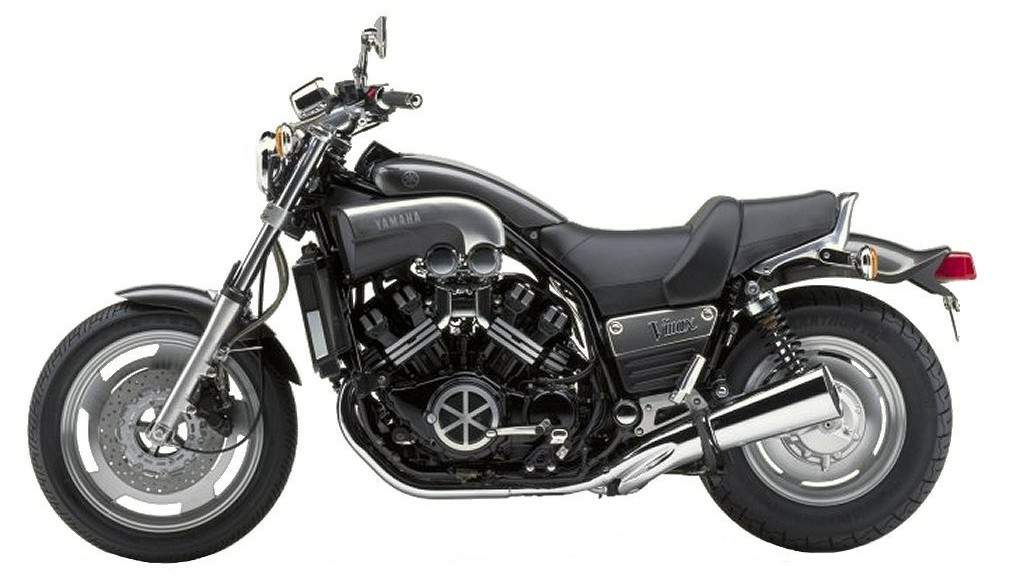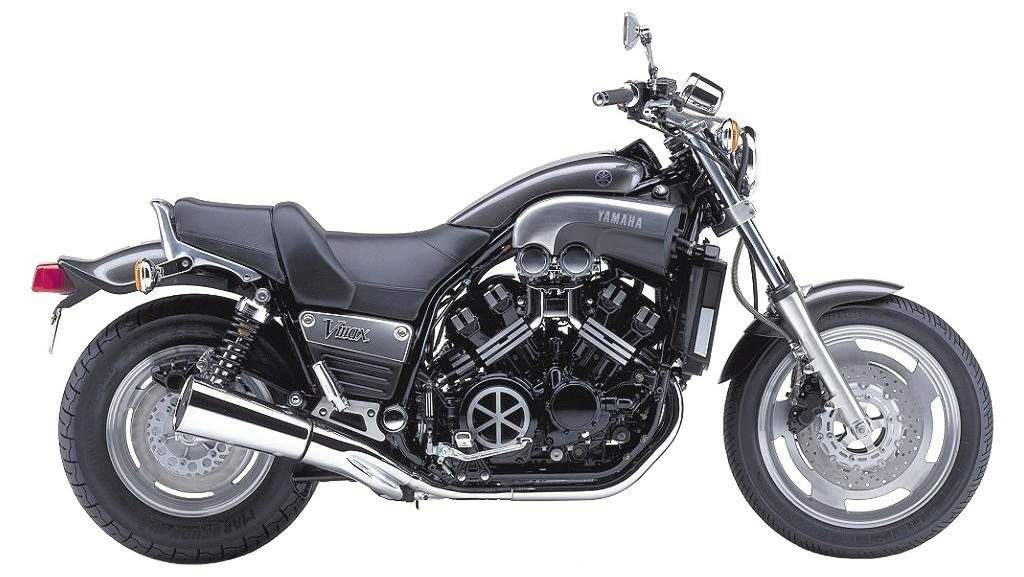
Yamaha V-MX 1200 V-Max SPECIFICATIONS, PRICE & IMAGES
s musclebike life: sometimes a short one.
or lack of: the Speed Triple
is mostly about the naked look).
We had our doubts about including the Triumph in the test: After all, at only
885 cc, it gave away capacity to the multi cylinder competition and much weight
to the twin cylinder rival (the Ducati). And at first the motor seemed
low-powered:That was until we ran all the bikes away from the lights at once,
and the Triumph took the lead. It’s a great motor once you realize it has to be
revved. There’s not too much power down low in the rpm range, but get that three
cylinder motor spinning and it pulls with alacrity. Carburetion glitches seem to
hamper the Triumph in the midrange, and we’re sure that a little tuning would
help the gas consumption:the Triple was the thirstiest of the lot, even
out-gulping the V-Max into the low thirties when both were ridden side by side.
legged riders: One of the reasons Triumph’s
Thunderbird is popular is that shorter riders can get their feet on the ground).
Combine the height with the mushy, wallowy suspension and uncertain handling and
you have a recipe for rider distrust. These criticisms have been leveled at
Triumph for several years now, and we’re beginning to wonder why they don’t fix
up the suspension to suit the sporty image they’ve adopted. True, very few
Triumph owners will push their bikes to the limit, but the competition (even the
big, wallowy Honda) is just so much better around the bends. Heck, even the
V-max wasn’t that much worse.
Compromises in the suspension let this motorcycle down: but even with its
compromised design, if it had been a smoother suspended performer, it would have
been hard to beat on the street. For:Character, soulful wail of three cylinder
motor. Good brakes. Surprising peak power Against:Hi-strung, peaky power, odd
riding position nobody liked, spongy front suspension.
may be listed again next year: Certainly the CB1000 is still available in the
rest of the world as a new 1996 model.
s shaft drive: the Honda uses a chain).
The blocky, liquid-cooled motor may be familiar if you’ve ever seen inside a
CBR1000’s plastic covers. The basic engine is the same, albeit with one less
gear, but is modified with carburetion, compression and ignition changes to give
more low down torque compared to the sportster, and it feels like it too. Power
output is woolly, feels almost entirely peakless. It feels so soft that the dyno
figures were a surprise:We didn’t think the bike made as much power as the dyno
showed.
Il Mostro it was originally called: The Monster bike. A beautiful grotesque from
the country that makes, undoubtedly, the most stylish motorcycles in the world.
And it wasn’t even red. It was the smallest, lightest, least powerful machine in
the test, but the one that took top muscle bike honors, at least in the absence
of the Buell S1 (see sidebar, below).
The gearchange is slightly notchy: the hydraulic clutch has never been famous
for its smoothness (or its longevity). But once on the move, gearchanges were
sure, and the movement of the lever is short and positive. Front suspension is
not optimum for handling, lacking much in the way of rebound damping, having
compression damping that is a tad too harsh over expansion joints, and not being
adjustable at all. Handling is not quite predictable:throw the bike hard into a
corner and it feels like it wants to bounce back. But it will see off any of the
other three, quite handily. As you’d expect, fuel consumption was the best of
any of the bikes on test, coming in at well over the 40mpg range, and the
rider’s butt and shoulder muscles will be sore well before the range of the 5
gallon tank is exhausted. But muscle bikes aren’t about long range touring:their about see and be seen, blasting away from the lights hooliganism. And for
all this, the Ducati is number one.
Riding Impressions: 1.
ve ridden three Ducatis in my life: Pushed the first two home, and the third
one, our Monster testbike, cost me a boatload of cash after a simple parking lot
tipover (thanks, Todd) dented the $1000.00 tank and we had to replace it. So I
don’t think I’d buy a Monster — especially with the weak clutch and driveline a
timebomb waiting to explode — and I can’t recommend that you do. Sure, the Duke
was, by far, the most exciting bike in this test, but the costs are just too
high for me.


Bike Features
Make Model:
Yamaha V-Max
Year:
1999 – 01
Engine:
Four stroke, V-four, DOHC, 4
valve per cylinder.
Capacity:
1198 cc / 73.1 cu-in
Bore x Stroke:
76 х 66 mm
Cooling System:
Liquid cooled
Compression Ratio:
10.5:1
Induction:
4x 35mm Mikuni BDS35 carburetor
Ignition :
CDI
Starting:
Electric
Max Power :
102 hp / 74.4 kW @ 8000 rpm
Max Power Rear Tyre:
97.88 @ 7700
rpm
Max Torque:
114.7 Nm / 86.4 lb-ft @ 6000 rpm
Clutch:
Wet, multi disc
Transmission :
5 Speed
Final Drive:
Shaft
Frame:
Double cradle steel tube
Front Suspension:
40mm Kayaba forks, Air pressure
Front Wheel Travel:
140 mm / 5.5 in
Rear Suspension:
Dual Kayaba shocks,
adjustable for preload damping.
Rear Wheel Travel:
100 mm / 3.9in
Front Brakes:
2x 298mm discs 2 piston calipers
Rear Brakes:
Single 282mm disc 2 piston caliper
Front Tyre:
110/90-18
Rear Tyre:
150/90-15
Rake:
29°
Trail:
119 mm / 4.7 in
Wheelbase:
1590 mm / 65.6 in
Seat height :
765 mm / 30.1 in
Ground Clearance:
145 mm / 5.7 in
Dry Weight:
262 kg / 577.6 lbs
Fuel Capacity :
15 Litres / 3.9 US gal
Consumption Average:
13.1 km/lit
Braking 60 – 0 / 100 – 0:
13.2 m / 39.0 m
Standing
¼ Mile :
11.7 sec / 185.8 km/h
Top Speed:
216.7 km/h
